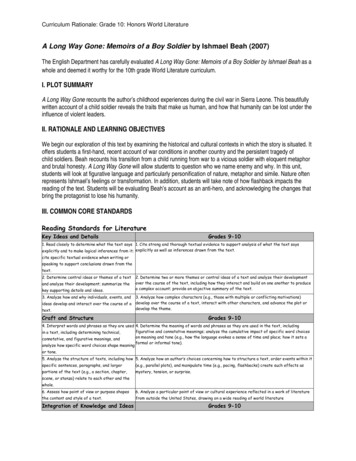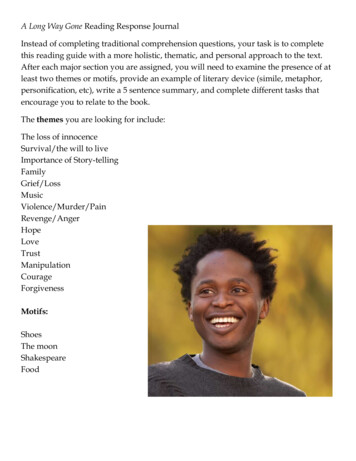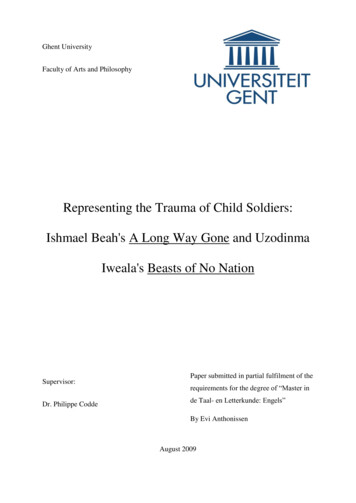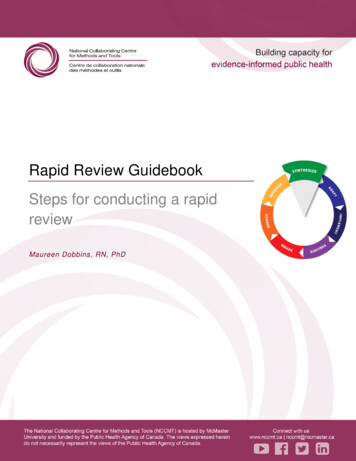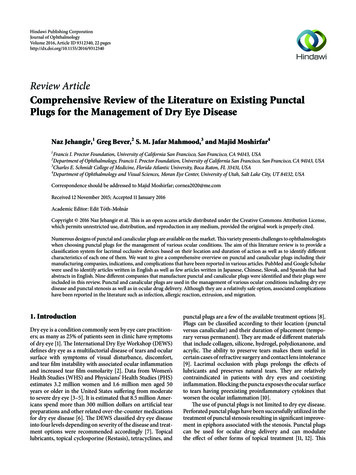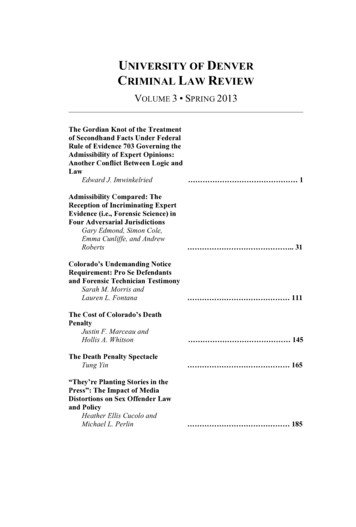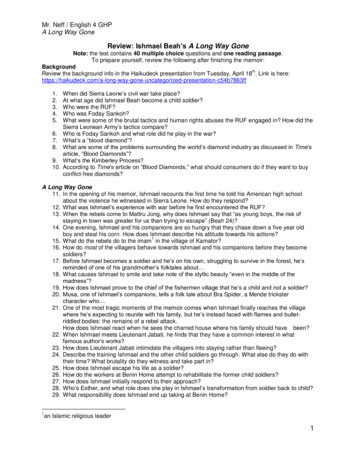
Transcription
Mr. Neff / English 4 GHPA Long Way GoneReview: Ishmael Beah’s A Long Way GoneNote: the test contains 40 multiple choice questions and one reading passage.To prepare yourself, review the following after finishing the memoir:BackgroundthReview the background info in the Haikudeck presentation from Tuesday, April 18 . Link is .When did Sierra Leone’s civil war take place?At what age did Ishmael Beah become a child soldier?Who were the RUF?Who was Foday Sankoh?What were some of the brutal tactics and human rights abuses the RUF engaged in? How did theSierra Leonean Army’s tactics compare?Who is Foday Sankoh and what role did he play in the war?What’s a “blood diamond”?What are some of the problems surrounding the world’s diamond industry as discussed in Time’sarticle, “Blood Diamonds”?What’s the Kimberley Process?According to Time’s article on “Blood Diamonds,” what should consumers do if they want to buyconflict-free diamonds?A Long Way Gone11. In the opening of his memoir, Ishmael recounts the first time he told his American high schoolabout the violence he witnessed in Sierra Leone. How do they respond?12. What was Ishmael’s experience with war before he first encountered the RUF?13. When the rebels come to Mattru Jong, why does Ishmael say that “as young boys, the risk ofstaying in town was greater for us than trying to escape” (Beah 24)?14. One evening, Ishmael and his companions are so hungry that they chase down a five year oldboy and steal his corn. How does Ishmael describe his attitude towards his actions?115. What do the rebels do to the imam in the village of Kamator?16. How do most of the villagers behave towards Ishmael and his companions before they becomesoldiers?17. Before Ishmael becomes a soldier and he’s on his own, struggling to survive in the forest, he’sreminded of one of his grandmother’s folktales about 18. What causes Ishmael to smile and take note of the idyllic beauty “even in the middle of themadness”?19. How does Ishmael prove to the chief of the fishermen village that he’s a child and not a soldier?20. Musa, one of Ishmael’s companions, tells a folk tale about Bra Spider, a Mende trickstercharacter who 21. One of the most tragic moments of the memoir comes when Ishmael finally reaches the villagewhere he’s expecting to reunite with his family, but he’s instead faced with flames and bulletriddled bodies: the remains of a rebel attack.How does Ishmael react when he sees the charred house where his family should have been?22. When Ishmael meets Lieutenant Jabati, he finds that they have a common interest in whatfamous author’s works?23. How does Lieutenant Jabati intimidate the villagers into staying rather than fleeing?24. Describe the training Ishmael and the other child soldiers go through. What else do they do withtheir time? What brutality do they witness and take part in?25. How does Ishmael escape his life as a soldier?26. How do the workers at Benin Home attempt to rehabilitate the former child soldiers?27. How does Ishmael initially respond to their approach?28. Who’s Esther, and what role does she play in Ishmael’s transformation from soldier back to child?29. What responsibility does Ishmael end up taking at Benin Home?1an Islamic religious leader1
Mr. Neff / English 4 GHPA Long Way Gone30.31.32.33.How does Ishmael end up coming to the United States?Who is Laura Simms and what role does she play in Ishmael’s life?What happens to Ishmael when he returns to Sierra Leone? How does he manage to escape?Explain the monkey’s riddle. What happens in the anecdote Ishmael tells, and what is his intent inusing it to close his memoir?34. Identify some of the memories and activities Ishmael associates with the happier times of hischildhood.35. Identify some specific symptoms of Ishmael’s Posttraumatic Stress Disorder (PTSD) from theexperiences Ishmael describes in his memoir (note: not the events that cause it, but rather theevidence of it)Reading Passage:“The Danger of a Single Story”By Chimamanda Ngozie AdichieNote: The TEDTalks version of this can be seen here:https://www.ted.com/talks/chimamanda adichie the danger of a single storyNigerian writer Chimamanda Adichie describes the effects that labels can have on how we think about ourselvesand others:I'm a storyteller. And I would like to tell you a few personal stories about what I like to call “the danger of thesingle story.” I grew up on a university campus in eastern Nigeria. My mother says that I started reading at the ageof two, although I think four is probably close to the truth. So I was an early reader, and what I read were Britishand American children’s books.I was also an early writer, and when I began to write, at about the age of seven, stories in pencil with crayonillustrations that my poor mother was obligated to read, I wrote exactly the kinds of stories I was reading: All mycharacters were white and blue-eyed, they played in the snow, they ate apples, and they talked a lot about theweather, how lovely it was that the sun had come out. Now, this despite the fact that I lived in Nigeria. I had neverbeen outside Nigeria. We didn't have snow, we ate mangoes, and we never talked about the weather, becausethere was no need to . . .What this demonstrates, I think, is how impressionable and vulnerable we are in the face of a story, particularly aschildren. Because all I had read were books in which characters were foreign, I had become convinced that booksby their very nature had to have foreigners in them and had to be about things with which I could not personallyidentify. Now, things changed when I discovered African books. There weren't many of them available, and theyweren't quite as easy to find as the foreign books.But because of writers like Chinua Achebe and Camara Laye, I went through a mental shift in my perception ofliterature. I realized that people like me, girls with skin the color of chocolate, whose kinky hair could not formponytails, could also exist in literature. I started to write about things I recognized.Now, I loved those American and British books I read. They stirred my imagination. They opened up new worlds forme. But the unintended consequence was that I did not know that people like me could exist in literature. So whatthe discovery of African writers did for me was this: It saved me from having a single story of what books are.I come from a conventional, middle-class Nigerian family. My father was a professor. My mother was anadministrator. And so we had, as was the norm, live-in domestic help, who would often come from nearby ruralvillages. So, the year I turned eight, we got a new house boy. His name was Fide. The only thing my mother told usabout him was that his family was very poor. My mother sent yams and rice, and our old clothes, to his family. Andwhen I didn't finish my dinner, my mother would say, “Finish your food! Don’t you know? People like Fide's familyhave nothing.” So I felt enormous pity for Fide’s family.2
Mr. Neff / English 4 GHPA Long Way GoneThen one Saturday, we went to his village to visit, and his mother showed us a beautifully patterned basket madeof dyed raffia that his brother had made. I was startled. It had not occurred to me that anybody in his family couldactually make something. All I had heard about them was how poor they were, so that it had become impossiblefor me to see them as anything else but poor. Their poverty was my single story of them.Years later, I thought about this when I left Nigeria to go to university in the United States. I was 19. My Americanroommate was shocked by me. She asked where I had learned to speak English so well, and was confused when Isaid that Nigeria happened to have English as its official language. She asked if she could listen to what she calledmy “tribal music,” and was consequently very disappointed when I produced my tape of Mariah Carey. Sheassumed that I did not know how to use a stove. What struck me was this: She had felt sorry for me even beforeshe saw me. Her default position toward me, as an African, was a kind of patronizing, well-meaning pity. Myroommate had a single story of Africa: a single story of catastrophe. In this single story, there was no possibility ofAfricans being similar to her in any way, no possibility of feelings more complex than pity, no possibility of aconnection as human equals . . .So, after I had spent some years in the U.S. as an African, I began to understand my roommate's response to me. IfI had not grown up in Nigeria, and if all I knew about Africa were from popular images, I too would think that Africawas a place of beautiful landscapes, beautiful animals, and incomprehensible people, fighting senseless wars, dyingof poverty and AIDS, unable to speak for themselves and waiting to be saved by a kind, white foreigner. I wouldsee Africans in the same way that I, as a child, had seen Fide's family . . .And so, I began to realize that my American roommate must have throughout her life seen and heard differentversions of this single story . . .But I must quickly add that I too am just as guilty in the question of the single story. A few years ago, I visitedMexico from the U.S. The political climate in the U.S. at the time was tense, and there were debates going onabout immigration. And, as often happens in America, immigration became synonymous with Mexicans. Therewere endless stories of Mexicans as people who were fleecing the healthcare system, sneaking across the border,being arrested at the border, that sort of thing.I remember walking around on my first day in Guadalajara, watching the people going to work, rolling up tortillasin the marketplace, smoking, laughing. I remember first feeling slight surprise. And then, I was overwhelmed withshame. I realized that I had been so immersed in the media coverage of Mexicans that they had become one thingin my mind, the abject immigrant. I had bought into the single story of Mexicans and I could not have been moreashamed of myself. So that is how to create a single story, show a people as one thing, as only one thing, over andover again, and that is what they become.It is impossible to talk about the single story without talking about power. There is a word, an Igbo [a languagespoken in Nigeria] word, that I think about whenever I think about the power structures of the world, and it is“nkali.” It's a noun that loosely translates to “to be greater than another.” Like our economic and political worlds,stories too are defined by the principle of nkali: How they are told, who tells them, when they're told, how manystories are told, are really dependent on power.Power is the ability not just to tell the story of another person, but to make it the definitive story of that person.The Palestinian poet Mourid Barghouti writes that if you want to dispossess a people, the simplest way to do it isto tell their story and to start with, “secondly.” Start the story with the arrows of the Native Americans, and notwith the arrival of the British, and you have an entirely different story. Start the story with the failure of the Africanstate, and not with the colonial creation of the African state, and you have an entirely different story . . .When I learned, some years ago, that writers were expected to have had really unhappy childhoods to besuccessful, I began to think about how I could invent horrible things my parents had done to me. But the truth isthat I had a very happy childhood, full of laughter and love, in a very close-knit family.3
Mr. Neff / English 4 GHPA Long Way GoneBut I also had grandfathers who died in refugee camps. My cousin Polle died because he could not get adequatehealthcare. One of my closest friends, Okoloma, died in a plane crash because our fire trucks did not have water. Igrew up under repressive military governments that devalued education, so that sometimes, my parents were notpaid their salaries. And so, as a child, I saw jam disappear from the breakfast table, then margarine disappeared,then bread became too expensive, then milk became rationed. And most of all, a kind of normalized political fearinvaded our lives.All of these stories make me who I am. But to insist on only these negative stories is to flatten my experience andto overlook the many other stories that formed me. The single story creates stereotypes, and the problem withstereotypes is not that they are untrue, but that they are incomplete. They make one story become the only story.Of course, Africa is a continent full of catastrophes: There are immense ones, such as the horrific rapes in Congoand depressing ones, such as the fact that 5,000 people apply for one job vacancy in Nigeria. But there are otherstories that are not about catastrophe, and it is very important, it is just as important, to talk about them.I've always felt that it is impossible to engage properly with a place or a person without engaging with all of thestories of that place and that person. The consequence of the single story is this: It robs people of dignity. It makesour recognition of our equal humanity difficult. It emphasizes how we are different rather than how we are similar.So what if before my Mexican trip, I had followed the immigration debate from both sides, the U.S. and theMexican? What if my mother had told us that Fide's family was poor and hardworking? What if we had an Africantelevision network that broadcast diverse African stories all over the world? What the Nigerian writer ChinuaAchebe calls “a balance of stories.”What if my roommate knew about my Nigerian publisher, Muhtar Bakare, a remarkable man who left his job in abank to follow his dream and start a publishing house? Now, the conventional wisdom was that Nigerians don'tread literature. He disagreed. He felt that people who could read, would read, if you made literature affordableand available to them . . .Now, what if my roommate knew about my friend Fumi Onda, a fearless woman who hosts a TV show in Lagos,and is determined to tell the stories that we prefer to forget? What if my roommate knew about the heartprocedure that was performed in the Lagos hospital last week? What if my roommate knew about contemporaryNigerian music, talented people singing in English and Pidgin, and Igbo and Yoruba and Ijo, mixing influences fromJay-Z to Fela to Bob Marley to their grandfathers[?]What if my roommate knew about the female lawyer who recently went to court in Nigeria to challenge aridiculous law that required women to get their husband's consent before renewing their passports? What if myroommate knew about Nollywood, full of innovative people making films despite great technical odds, films sopopular that they really are the best example of Nigerians consuming what they produce? What if my roommateknew about my wonderfully ambitious hair braider, who has just started her own business selling hair extensions?Or about the millions of other Nigerians who start businesses and sometimes fail, but continue to nurse ambition?Every time I am home I am confronted with the usual sources of irritation for most Nigerians: our failedinfrastructure, our failed government, but also by the incredible resilience of people who thrive despite thegovernment, rather than because of it. I teach writing workshops in Lagos every summer, and it is amazing to mehow many people apply, how many people are eager to write, to tell stories . . .Stories matter. Many stories matter. Stories have been used to dispossess and to malign, but stories can also beused to empower and to humanize. Stories can break the dignity of a people, but stories can also repair thatbroken dignity.The American writer Alice Walker wrote this about her Southern relatives who had moved to the North. Sheintroduced them to a book about the Southern life that they had left behind. “They sat around, reading the book4
Mr. Neff / English 4 GHPA Long Way Gonethemselves, listening to me read the book, and a kind of paradise was regained.” I would like to end with thisthought: That when we reject the single story, when we realize that there is never a single story about any place,we regain a kind of paradise.What’s the speaker’s main idea or through line in this speech?Identify some specific ways the author supports her main idea.According to the author, what are the dangers of a single story?Before Ishmael Beah arrives in America, he relates some beliefs about the country that furthersupport Adichie’s claims. What are they?40. Reread the following excerpt from the end of Adichie’s speech:Of course, Africa is a continent full of catastrophes: There are immense ones, such as the horrific rapes inCongo and depressing ones, such as the fact that 5,000 people apply for one job vacancy in Nigeria. Butthere are other stories that are not about catastrophe, and it is very important, it is just as important, totalk about them.36.37.38.39.A Long Way Gone is, at times, a brutal and violent book. But what are some specific stories andexperiences Beah relates that deliver on Adichie’s call to tell “stories [about Africa] that are notabout catastrophe”?5
A Long Way Gone 1 Review: Ishmael Beah’s A Long Way Gone Note: the test contains 40 multiple choice questions and one reading passage. To prepare yourself, review the following after finishing the memoir: Background Review the background info in the Haiku
